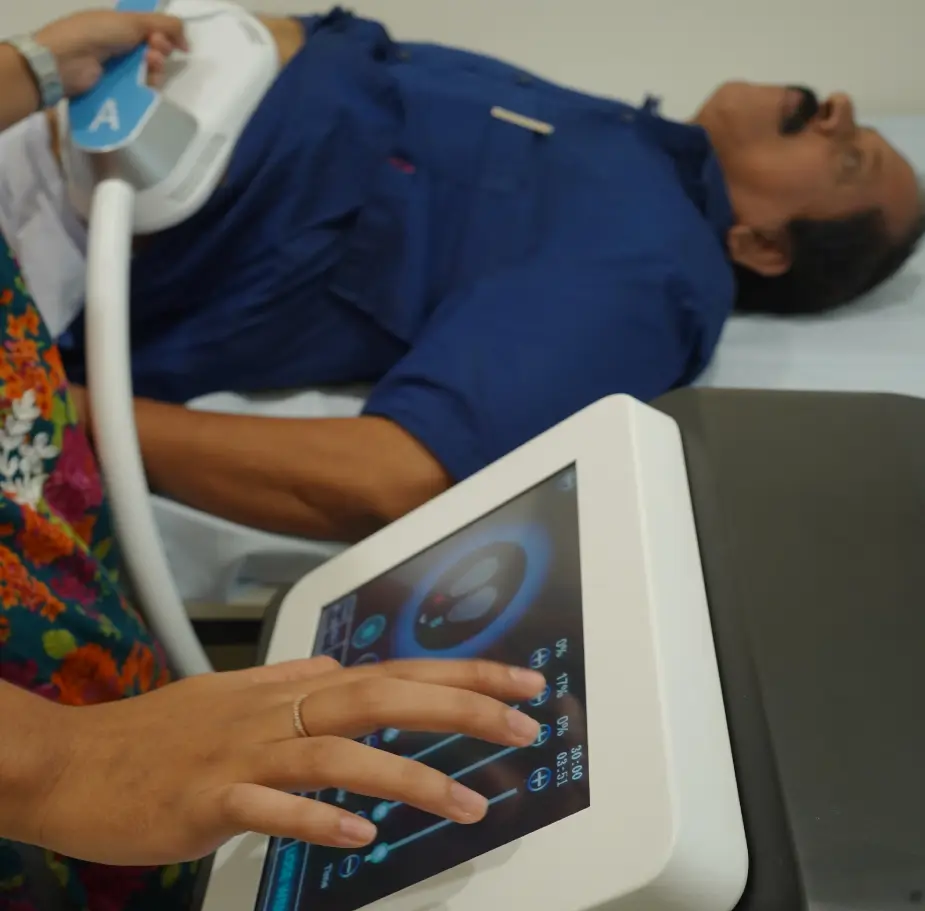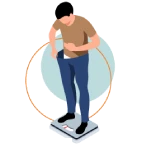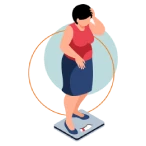Programs
Medical Weight Loss & Maintenance Program
Discover Maana Health’s scientifically proven Medical Weight Loss & Maintenance Program, offers scientifically proven methods for weight loss, providing hope for those suffering from conditions like type 2 diabetes, PCOD, and fertility issues. We integrate physiotherapy & advanced rehab techniques such as acceptance-based behavioral therapy, extracorporeal shockwave therapy, high-intensity focused electromagnetic (HIFEM) and radio frequency (RF) therapy, lifestyle management, etc.
Best Weight Loss Treatment Approach
The Medical Weight Loss & Maintenance Program by Maana Health is a scientifically proven, side-effect-free approach to weight loss and maintenance, supporting long-term sustainability.
Long-term maintenance is crucial for sustainable weight loss. Maana Health’s acceptance-based approach helps individuals develop resilience and coping strategies, leading to lasting behavior change. By fostering self-compassion and mindfulness, this approach supports individuals in navigating challenges and setbacks, empowering them to maintain their weight loss journey for the long term.

Non-surgical

Sustainable Weight Maintenance

Sustainable Weight Maintenance

Holistic Approach

Enhanced Muscle Definition

10 - 15% Body Weight Reduction with ABT

Rapid Fat Reduction

Improved Emotional Well-being

Fat Loss & Muscle Gain with HIFEM + RF
Program Elements
Maana Health’s Medical Weight Loss & Maintenance Program maximizes treatment effectiveness by combining various elements for a holistic approach.
Our treatment modalities and treatment approaches are US FDA and CE-approved which activate the body’s self-healing and muscle-strengthening mechanisms and do not have any side effects. We combine accepted-based behavioral therapy, extracorporeal shockwave therapy, cryo therapy, exercises & rehabilitation, diet and nutrition management, and lifestyle management. This holistic approach addresses the issue from all perspectives, making our program unique. The elements of the program are



Cryotherapy

Diet & Nutrition Counselling

High-intensity Focused Electromagnetic (HIFEM) & Radio Frequency (RF) Therapy

Rehabilitation

Lifestyle Management

Extracorporeal Shockwave Therapy

Electrical Muscle Stimulation
Conditions We Heal
Maana Health’s Medical Weight Loss & Maintenance Program aims to restore mobility, alleviate pain, and enhance your overall quality of life by addressing the root cause of your condition, all without the need for surgery.

Metabolic Disorders Correction

Heart Health Optimization
Best Weight Loss Treatment Approach
Acceptance-based Behavioral Therapy
Maana Health’s weight loss program integrates Acceptance-based Behavioral Therapy with advanced modalities like HIFEM, ESWT, and Cryo for a unique approach. It emphasizes self-acceptance and mindful awareness, supported by evidence-based methods, practical guidance, and mindful eating. The program focuses on sustainable behavioral changes, motivation, self-compassion, and empowerment, providing real-life examples to support individuals in their personalized weight loss journey.

Tummy Fat Reduction
High-intensity Focused Electromagnetic (HIFEM) & radio Frequency (RF) Therapy
Maana Health’s holistic approach combines High-intensity Focused Electromagnetic (HIFEM) and radio frequency (RF) therapy to target tummy fat reduction. HIFEM stimulates muscle contractions, building muscle mass and reducing fat, while RF therapy enhances collagen production and tightens the skin. When combined with Maana’s acceptance-based approach, this unique method not only addresses physical aspects but also promotes self-acceptance and mindful awareness, supporting individuals in their weight loss journey. This holistic approach ensures a comprehensive solution, addressing both the physical and mental aspects of tummy fat reduction for sustainable and transformative results.

Electrical Muscle Stimulation (EMS)
Maana Health’s weight loss and maintenance program takes a holistic approach, integrating both body and mind to foster long-term health and well-being. A key component of our program is Electrical Muscle Stimulation (EMS), a non-invasive modality that helps support weight loss by stimulating muscles to contract, boosting metabolism, and promoting fat burning. EMS enhances muscle tone and strength, which can aid in achieving a leaner physique and improving overall fitness. Alongside EMS, we incorporate Acceptance-Based Behavioral Therapy (ABT) to address the psychological aspects of weight management, helping clients develop healthier relationships with food and body image. This combination of physical and mental support, along with other complementary modalities, ensures a balanced, sustainable approach to weight loss and long-term maintenance, empowering clients to achieve lasting results.

FAQ’s
Who is eligible for the Medical Weight Loss & Maintenance Program?
The Medical Weight Loss & Maintenance Program is suitable for individuals with PCOD, type 2 diabetes, fertility issues, etc, and those who struggle to lose weight.
How much does the Medical Weight Loss & Maintenance Program cost, and is it covered by insurance?
The cost varies based on individual needs and the components of the program. We offer transparent pricing, and our team can discuss payment options with you. While insurance coverage may vary, we can provide the necessary documentation for reimbursement if applicable.
How often will I have medical check-ups or consultations during the program?
The frequency of medical check-ups will be personalized based on your needs and progress. Regular consultations are scheduled to monitor your health, adjust the program as needed, and provide ongoing guidance.
Is HIFEM & RF painful, and are there any side effects?
HIFEM (High-intensity Focused Electromagnetic) therapy is not painful, although some individuals may experience mild discomfort during the treatment. As for side effects, HIFEM therapy is considered safe and non-invasive, with minimal reported side effects such as muscle soreness or redness in the treated area, which typically resolve quickly.
Other Programs
Maana Health offers a range of specialized programs designed to address various health needs without a surgical intervention.
Accreditations and Certifications


Research Evidences
The Mind Your Health Project: A Randomized Controlled Trial of an Innovative Behavioral Treatment for Obesity
Authors: E.M. Forman, M.L. Butryn, A.S. Juarascio, L.E. Bradley, M.R. Lowe, J.D. Herbert, and J.A. Shaw
You may be interested in these questions:
What were the key findings of the study on acceptance-based behavioral treatment for obesity?
The key findings of the study on acceptance-based behavioral treatment (ABT) for obesity are as follows:
- Greater Weight Loss: ABT resulted in greater weight loss compared to standard behavioral treatment (SBT), especially when administered by experts.
- Moderation by Psychological Characteristics: ABT was more effective for individuals with higher levels of depression, emotional eating, and responsivity to food cues.
- Mediation by Food-Related Psychological Acceptance: The study provided partial support for food-related psychological acceptance as a mechanism of action in weight loss outcomes.
These findings suggest that incorporating acceptance-based skills into weight loss treatments, particularly for individuals with specific psychological characteristics, can lead to improved outcomes in obesity management.
How did the expertise of interventionists impact the effectiveness of the treatments?
The expertise of interventionists had a significant impact on the effectiveness of the treatments in the study on acceptance-based behavioral treatment for obesity. Here are the key points regarding the impact of interventionist expertise:
- Weight Loss Discrepancy: When ABT was provided by weight control experts, there was a significant difference in weight loss outcomes compared to SBT. ABT led to greater weight loss when administered by experts.
- Superior Results: Participants who received ABT from experts showed significantly higher weight loss percentages at post-treatment and 6-month follow-up compared to those who received SBT.
- Maintenance of Weight Loss: A higher percentage of participants maintained at least a 10% weight loss by follow-up when they received ABT from experts, indicating the importance of expertise in achieving and sustaining weight loss goals.
In summary, the study demonstrated that the expertise of interventionists, particularly in weight control, played a crucial role in enhancing the effectiveness of acceptance-based behavioral treatment for obesity.
What role did food-related psychological acceptance play in the weight loss outcomes?
Food-related psychological acceptance played a significant role in the weight loss outcomes of the study on acceptance-based behavioral treatment for obesity. Here are the key points regarding the role of food-related psychological acceptance:
- Mediation Analysis: The study conducted mediation analyses to assess the indirect effects of food-related psychological acceptance on the effectiveness of ABT compared to SBT.
- Moderated Mediation: Among participants with higher levels of emotional eating, psychological acceptance of food-related internal experiences was found to mediate the benefit of ABT over SBT. This suggests that acceptance-based strategies were particularly beneficial for individuals with high emotional eating tendencies.
- Enhanced Willingness: Psychological acceptance of food-related internal experiences, such as urges and cravings, was emphasized in ABT to increase willingness to experience discomfort while aligning behaviors with personal values.
- Uncoupling Internal Experiences: ABT focused on skills like “urge surfing” and “defusion” to help participants distance themselves from thoughts and feelings related to food, promoting a more adaptive response to internal experiences without resorting to unhealthy eating behaviors.
In conclusion, food-related psychological acceptance played a crucial role in mediating the effectiveness of ABT, especially among individuals with higher emotional eating tendencies, highlighting the importance of acceptance-based strategies in promoting successful weight loss outcomes.
Acceptance-Based Versus Standard Behavioral Treatment for Obesity: Results from the Mind Your Health Randomized Controlled Trial
Authors: Evan M. Forman, Meghan L. Butryn, Stephanie M. Manasse, Ross D. Crosby, Stephanie P. Goldstein, Emily P. Wyckoff, and J. Graham Thomas
You may be interested in these questions:
What were the key findings of the study comparing acceptance-based behavioral treatment with standard behavioral treatment for obesity?
The key findings of the study comparing acceptance-based behavioral treatment (ABT) with standard behavioral treatment (SBT) for obesity were:
- Participants assigned to ABT achieved a significantly greater 12-month weight loss compared to those assigned to SBT.
- ABT participants were more likely to maintain a 10% weight loss at 12 months.
- ABT showed a shallower trajectory of weight loss followed by weight maintenance, while SBT had an upward deflection in weight.
- No evidence of moderation was found, indicating that the benefits of ABT were consistent across different participant characteristics.
- The mediating role of autonomous motivation and psychological acceptance of food-related urges was supported in the effectiveness of ABT for weight loss.
How did the study assess the mediating role of psychological acceptance and autonomous motivation in the effectiveness of acceptance-based treatment for weight loss?
The study assessed the mediating role of psychological acceptance and autonomous motivation in the effectiveness of acceptance-based treatment (ABT) for weight loss through the following methods:
- Conducted mediation analyses using the PROCESS macro for SPSS to evaluate whether changes in psychological acceptance and autonomous motivation from baseline to mid-treatment mediated the effect of treatment condition on 12-month weight loss.
- Used bootstrapping techniques to estimate the indirect effects of psychological acceptance and autonomous motivation on weight loss.
- Analyzed the data to determine if changes in psychological acceptance and autonomous motivation during the treatment period mediated the impact of ABT on weight loss outcomes.
- Found that both psychological acceptance of food-related urges and cravings, as well as autonomous motivation, mediated the effect of ABT on weight loss, supporting the proposed mechanisms of action underlying ABT.
What self-regulation skills were emphasized in the acceptance-based behavioral treatment for obesity, according to the study?
The self-regulation skills emphasized in the acceptance-based behavioral treatment (ABT) for obesity, as outlined in the study, included:
- Tolerating uncomfortable internal states such as urges, cravings, and negative emotions.
- Choosing behaviors that may reduce pleasure, such as opting for exercise over sedentary activities.
- Behavioral commitment to clearly defined values, which can increase motivation to persist in weight control behaviors.
- Metacognitive awareness of decision-making processes related to food choices.
- Accepting discomfort and reduction in pleasure related to food choices.
- Being mindfully aware during moments of decision-making, especially in the context of an obesogenic food environment.
These self-regulation skills were integrated into the ABT protocol to help participants adhere to behavioral recommendations for weight loss despite challenges posed by biological predispositions and environmental cues.
Blog
Latest News & Resources
The Connection Between Weight Loss and Joint Health: What You Need to Know
Joint pain and stiffness can significantly impact your quality of life, limiting mobility and...
Best Non-surgical Weight Loss Procedures: Fast Weight Loss without Surgery
In today's fast-paced world, many people are looking for quick and effective ways to lose weight...
How to lose belly fat without surgery: Expert tips
Abdominal obesity, also known as belly fat or visceral fat, is a common problem that many people...
Office
Monday – Saturday : 8:30 am to 6:00 pm







